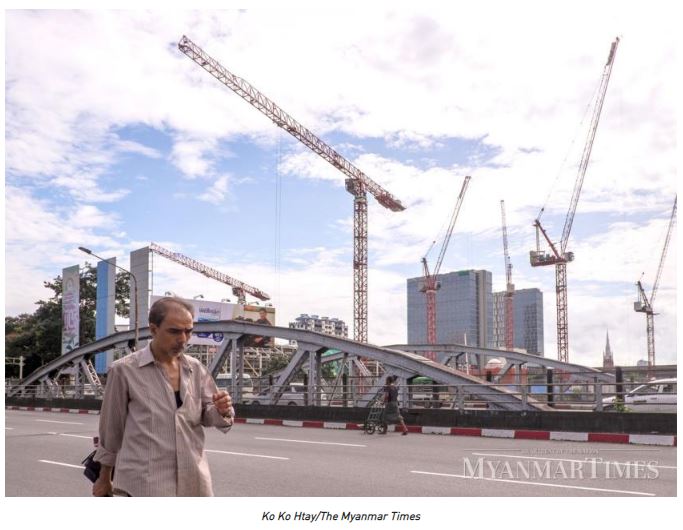Myanmar: Questions arise over cost, accessibility of two-step loans
Despite the important role small and medium enterprises (SMEs) play in the economy, repeated requests for more affordable loans and easier access to financing remain a challenge for the sector.
One avenue for SMEs to access financing in Myanmar is via funds provided by official development assistance organisations such as Japan International Cooperation Agency (JICA).
Under these loans, JICA provides funds to government and local banks at interest rates of as low as 0.1pc. The banks then disburse the loans to end users at around 8.5pc. Of this, 4pc is absorbed by the government, while the remaining 4.5pc by the private banks. Recipients are still required to provide collateral or take up credit guarantee insurance.
Early last month, the Mandalay Region Chamber of Commerce and Industry (MRCCI) issued its Business Agenda 2022, an advocacy roadmap outlining MRCCI policy positions on the issues of greatest importance to Mandalay employers.
In the roadmap, the MRCCI said although the 8.5pc interest rate loans are available, many SMEs and start-ups face difficulties in obtaining them and many simply opt for the normal loans with interest rates of 13pc, adding that red tape in applying for these loans can take up a considerable amount of time.
“We need to get project loans and other loans as rapidly as possible. If so, we can compete more effectively. The Central Bank of Myanmar needs to ease interest rate restrictions imposed on private banks,” said MRCCI Deputy Chair U Myat Htut.
On August 27, MP U Maung Myint, who is also the former union minister of industry, questioned the current loan system during a regular session of Pyithu Hluttaw.
“Although 8.5pc is less than the rate of 13pc for normal loans, it’s still too high for SMEs. It’s crucial for the government to review the 8.5 pc interest rate if they genuinely want to help SMEs grow,” said U Maung Myint.
‘Reasonable rate’
U Soe Thein, vice governor of Central Bank of Myanmar (CBM) explained that the interest rate of 8.5pc a year for MSME loans is not a condition imposed by the central bank, but by JICA itself.
“The funding provided by JICA must be repaid in Japanese yen. There can be foreign exchange losses and although government banks like Myanma Economic Bank earn 4pc interest from these loans, there is no profit guarantee and it even has to absorb foreign exchange losses,” U Soe Thein said.
Meanwhile, the CBM allows bank to earn with an interest spread of 5pc, which is the difference between the deposit interest rate of 8pc paid to account holders and loan interest rate of 13pc charged to borrowers. So the 4.5pc rate earned by private banks involved in disbursing two-step loans is within range. JICA also considered that if the interest rate is below 8.5pc a year, some borrowers might be incentivised to deposit the funds in banks instead of utilising the money to grow, he said. “Taking everything into consideration, it is a reasonable rate,” U Soe Thein said.
Still skeptical
Still, most SMEs in Myanmar are not able to access JICA funding with just little over 2200 out of 73000 officially registered SMEs in the country having actually obtained such loans.
“Although interest rates for SMEs must be sustainable for both banks and borrowers, I think that the work done by the government on the development of the SME sector is very weak. It needs to create a good environment where businesses can operate smoothly. Now, we don’t know exactly if these loans are beneficial to borrowers. If SMEs were actually developing, they wouldn’t face difficulties with loans,” said U Zaw Oo, a former economic adviser to the government.
U Kyaw Thiha, managing director of Nara Organic Green Tea, added that “loan limits and interest rates in Myanmar are not as good as in neighbouring countries. So the government needs to review it if it wants to develop local businesses.”
According to the ASEAN SME Policy Index 2018 issued by the Organization for Economic Co-operation and Development, Myanmar is below the ASEAN average and behind Thailand and Vietnam in terms of access to financing for SMEs.
Whatever the case, U Soe Thein said the current interest rate for SME loans will be maintained, although if banks submit a request to relax the terms for the loans, it will be seriously considered. According to the data released by the government, SMEs constitute 98pc of Myanmar’s economy. Over 50pc of SMEs are restaurants. – Translated
Source: https://www.mmtimes.com/news/questions-arise-over-cost-accessibility-two-step-loans.html


 Thailand
Thailand




